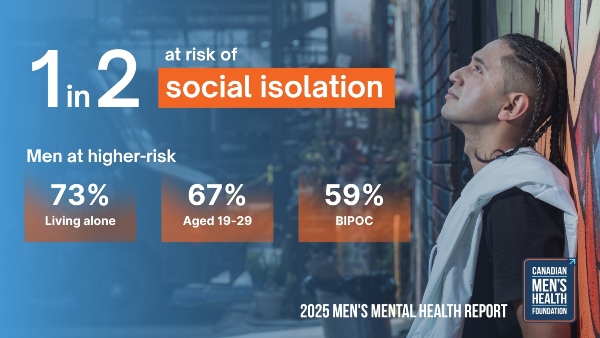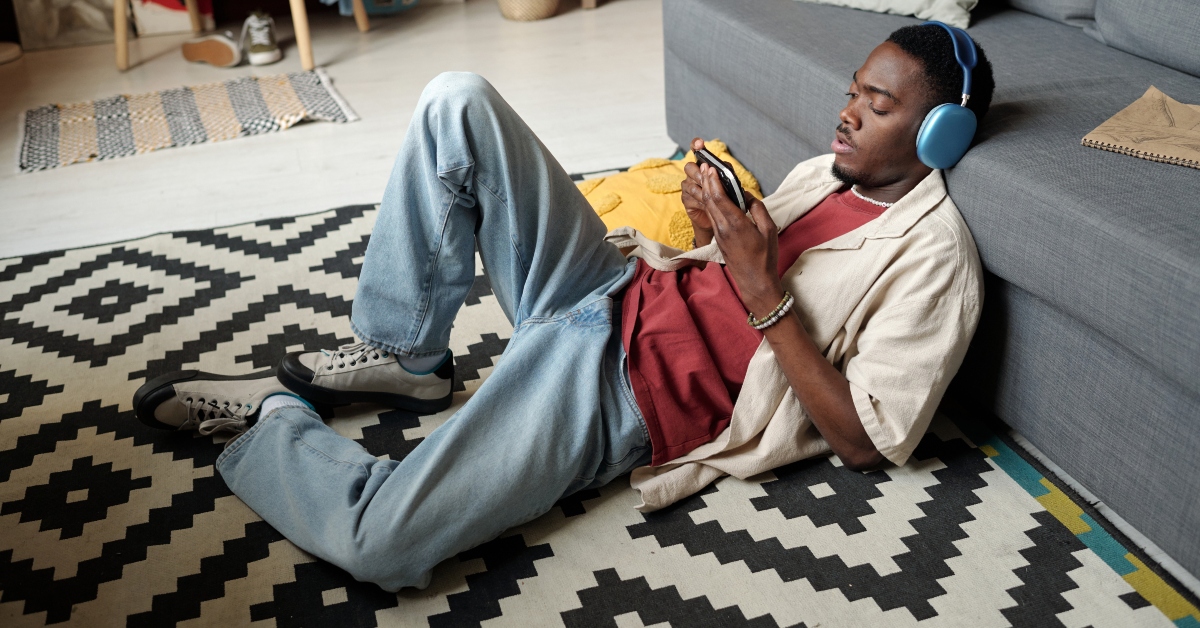According to a study by the Canadian Men’s Health Foundation, half of Canadian men are at risk of social isolation. Men across the country are feeling the weight of stress, uncertainty, and disconnection, and most aren’t reaching out for help.
The numbers paint a stark picture:
- 64% of men report moderate-to-high levels of stress
- 23% may face moderate-to-severe depression
- 67% have never spoken to a mental health professional
That’s not just data—it’s a snapshot of what life feels like for so many men right now. Tense. Overwhelmed. Alone.
“Men’s mental health is declining at an alarming rate, and too many—especially younger men—are facing these struggles on their own,” says Kenton Boston, President & CEO of CMHF. “We want men to know they aren’t alone. The Canadian Men’s Health Foundation is here for them, and we have tools to support them.”
Strong support networks
Even if you’re surrounded by people, it can still feel like no one really sees you.
That’s the case for one in two men in Canada who may face social isolation—something that deeply affects mental health and well-being.
“Having a strong support network is directly connected to our mental health,” says Dr. Rob Whitley, a men’s mental health researcher and Professor of Psychiatry at McGill. “And those networks are eroding for many men.”
He points to several reasons why:
- Cost of living: With less disposable income for socializing, many men have to work overtime or hold multiple jobs to make ends meet.
- Remote work and screen time: More men are working alone and spending their downtime online.
- Fewer places to belong: Participation in groups that promote male bonding, such as team sports, labour unions, and religious organizations, has declined, especially among men.
The risk is even higher for men who live alone (73%) and racialized men (59%), underscoring the need for stronger, more inclusive social supports.

Young men are feeling it the most
Among men aged 19–29, 67% report being socially isolated, the highest percentage of any age group.
“The formative years of social bonding—finishing high school, starting university or a first job—were disrupted for many young people,” says Dr. Robert Selles, a Registered Psychologist. “Pandemic lockdowns and the shift to remote life interrupted those key transitions from childhood relationships to new adult friendships.”
He also notes that young men today are facing unique challenges that previous generations did not encounter:
- Economic instability and unaffordable housing
- Anxiety about job futures due to automation and AI
- Constant exposure to global crises and negativity on social media
- A lack of in-person friendships and real-world support
“When people become emotionally overwhelmed—stressed, isolated, lonely and depressed—It makes them feel like they want to pull away,” said Dr. Selles. “It makes them feel more angry at the world.”
“What the evidence suggests is we want to get them doing the opposite. We want to get people to break out of that cycle by connecting, by engaging, by living their life in more meaningful, open ways.”
He emphasizes that the solution isn’t simply telling young men to ‘try harder’ or ‘tough it out.’ It’s about creating spaces that feel welcoming. “Connection, community and culture are things that we build together. We can’t just put it all on them to do it themselves.”
What you can do if you’re feeling alone
If any of this sounds familiar, you’re not alone.
Here are a few simple ways to start connecting:
- Send a quick message to a friend or family member. Just saying “hey” can open a door.
- Start talking about what’s really going on with you. If you already have someone close to you, try being more open about what’s really going on with you. This builds strong, trusting relationships with people you can rely on when things do get tough.
- Do something side-by-side. A walk, a game, a project—connection often happens when the pressure to talk disappears.
- Join a local community group or team. Pick something you enjoy, like hiking, woodworking, dance, or a sport, where you can find people who have the same interests.
- Spend less time alone in front of a screen. Replace with something social or outdoors, even 30 minutes makes a difference.
- Talk to a counsellor. A mental health check-in or a session with a counsellor can help more than you think.
One close relationship can be a lifeline. You don’t need to fix everything at once—just take one small step.
You’re never alone: resources to help
#NeverAlone was created by CMHF to encourage men to learn, connect, and access free, confidential mental wellness tools.
Visit menshealthfoundation.ca for self-assessments, expert advice, and stories from other guys who’ve been there.
“When men are supported, families thrive and communities grow stronger,” says B.C. Minister of Health Josie Osborne. “By encouraging men to talk openly, seek help, and build social connections, we’re helping build a healthier future for everyone.”
Join the #NeverAlone movement
We encourage you to share your videos and stories on social media using the hashtag #NeverAlone and tagging @menshealthfdn. Become part of the movement bringing men together.
You never know who needs to hear it.
We’d love to hear from you. Please comment below and let us know what you think of this new research.
Get The Right Tool For The Job
Free mental health resources for men. Manage stress, anxiety and depression with Mindfit Toolkit.






It’s really hard. I am in my early 20’s and it’s hard to carry everything on my back, juggle so many things, and make sure to not let anybody down and to succeed in the expectations of loved ones.
Hopefully it will get better soon, if not no clue what will happen.
Uplifting and Encouraging Advice towards all men. Thank you for your support,wisdom and guidance towards others and their overall Wellness.
Your a Blessing along with this Wonderful Organization
Tedd 🙏✌️
I just wanna change my gender
But i don’t even know how to start
Talking about it to someone is always a great start. There is a trans lifeline available in Canada if you’d like someone with life experience to talk to about it. You can find more info here.
~ Canadian Men’s Health Foundation team member
This is a great tool, as someone who struggles myself with limited mobility, and on Government Assistance, EVEVRYDAY truly is like a living nightmare for me especially since I am in my late 30’s, I have no savings and no place of my own, I isolate a lot and spend time worrying about being lonely and feel socially awkward when I do try to socialize, I wish there were online or in person classes that teach men things like wood working basics, plumbing etc…., that would really be a great outlet, but not just for BC but ALL Canada.
Thanks for sharing, Daryl. There is a Canada-wide organization called Men’s Sheds where they do that very thing. You can check them out here to see if there is one near you: https://mensshedscanada.ca/
~ Canadian Men’s Health Foundation team